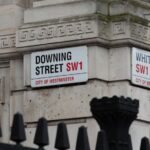The UK recorded the highest inflation rate since 1992 for January of this year. The figure came in at 5.5%.
But what does this have to do with the pound and more importantly, your overseas property purchase?
Get a quote from us today by completing our simple form. We’ll take a look at your requirements and arrange to speak to you at a suitable time to offer the best possible solution for all of your upcoming currency transfers.
Why was annual inflation so high in January?
Rising prices in housing and utilities were the main driving force behind the high inflation reading, with gas, electricity and food rising in price.
There are expectations that inflation will rise even further as the year goes on, particularly in April when Ofgem, the energy pricing regulator, is set to increase its energy price cap.
Core inflation, which excludes energy, food, alcohol and tobacco, was also higher than expected.
How could this impact the pound?
After this inflation data was released, the pound strengthened slightly against the dollar. However, could it have a longer-term impact on sterling?
Inflation is now well above the Bank of England’s target of 2%. Actions and comments from BoE officials surrounding this could have an impact on the pound going forward. There are now rising expectations that the Bank of England will hike interest rates again at its next monetary policy meeting, which could provide support for sterling.
Higher inflation is associated with hiking interest rates, and higher interest rates can attract foreign investment, which is likely to increase demand for the pound.
How will the Bank of England react?
As higher inflation is a sign that the economy is recovering, many are now left wondering if this higher reading could prompt the bank to hike interest rates sooner and withdraw monetary policy measures.
With inflation so high, many predict that the Bank will raise interest rates to 0.75% in March and 1% in May. Many also predict that there will be another rate hike in August and that the interest rate will reach 2% within a year.
The currency markets will now await the Bank of England’s next monetary policy meeting, which is due to take place on March 17. Any comments following this regarding inflation, interest rates and monetary policy could have an impact on the pound.
How do the EU and US fit into this?
How the pound fares could also depend on other central banks, particularly the Federal Reserve and the European Central Bank. If the Bank of England continues to lead the way with tapering monetary policy and hiking interest rates, taking action ahead of these other banks, this could boost the pound further.
European Central Bank officials are still maintaining a cautious approach, despite comments from ECB President, Christine Lagarde earlier this month. which seemed to suggest that interest rate rises could be possible this year. However, Lagarde and other officials have since backtracked on this.
The Federal Reserve is expected to raise interest rates by 25 basis points in March, however, there are calls for more aggressive action to be taken. US inflation is at a 40 year high, however, officials have to balance tackling this with economic recovery. If interest rates are raised too quickly, this could impact demand and slow economic progress following the pandemic.
How can you protect your property purchase from currency movements?
Although the pound is relatively strong at the moment, it’s impossible to predict how it will fare in the coming days and weeks. The Bank of England’s meeting next month could spell volatility for sterling, potentially having an impact on the price of your overseas property.
We can put measures in place, such as a forward contract, to ensure that your property buying budget is protected from this potential volatility. Contact our team on +44 (0)20 7898 0541 or fill in this short form.





















